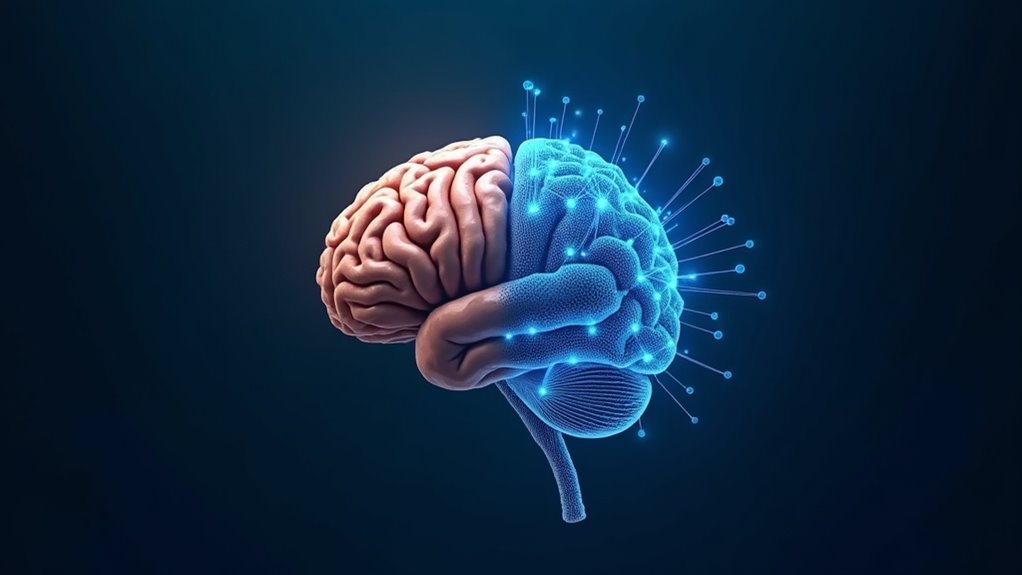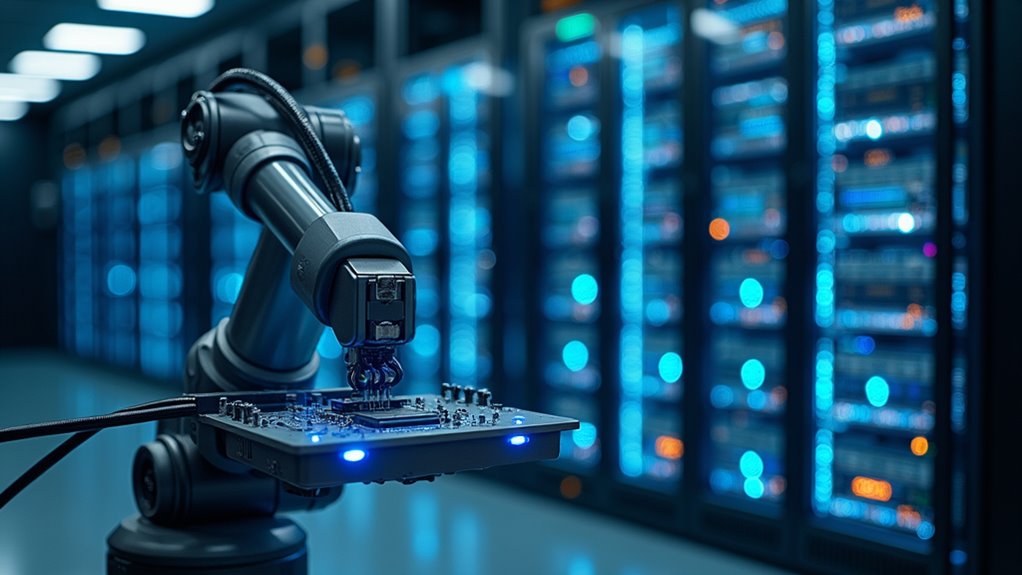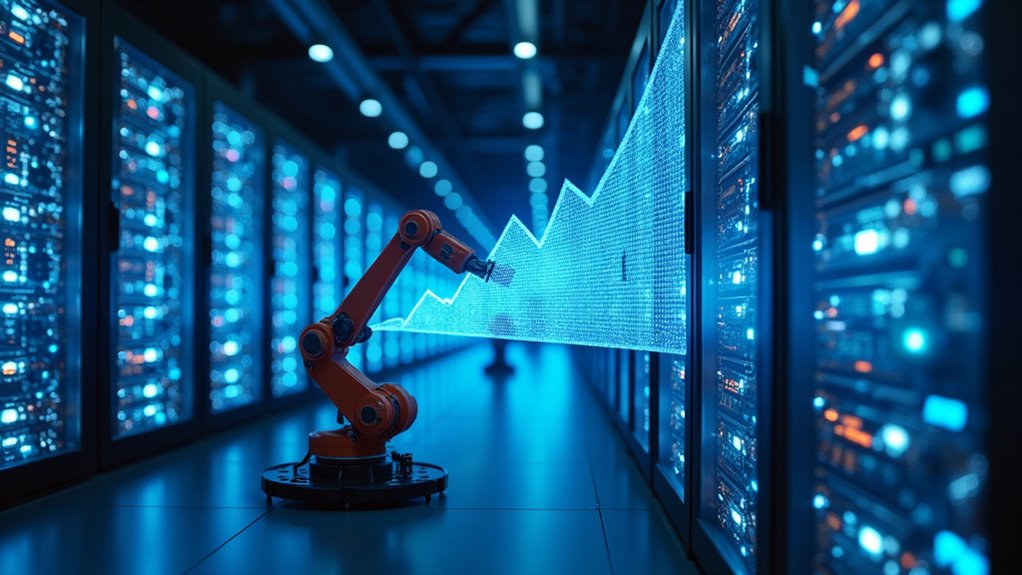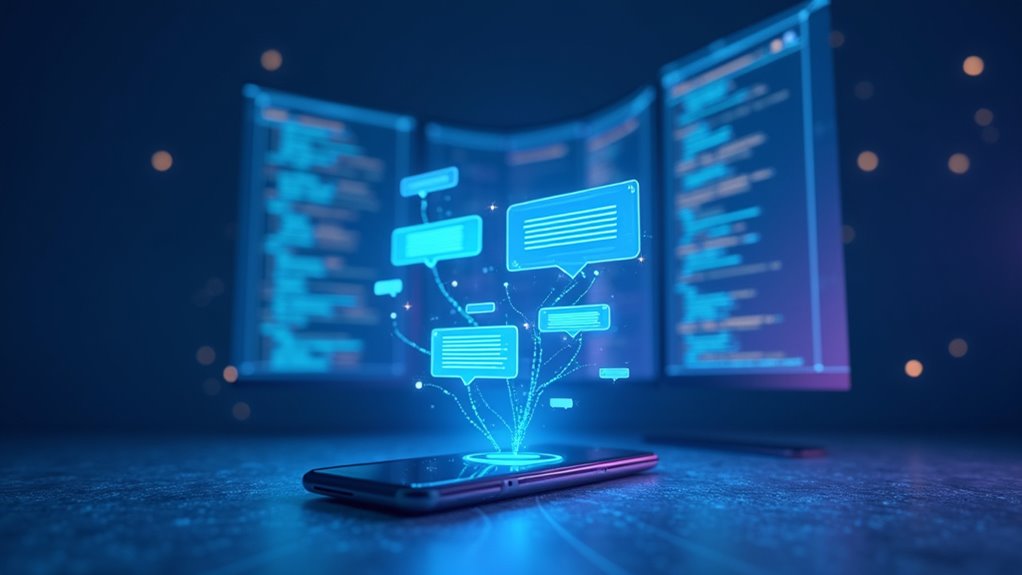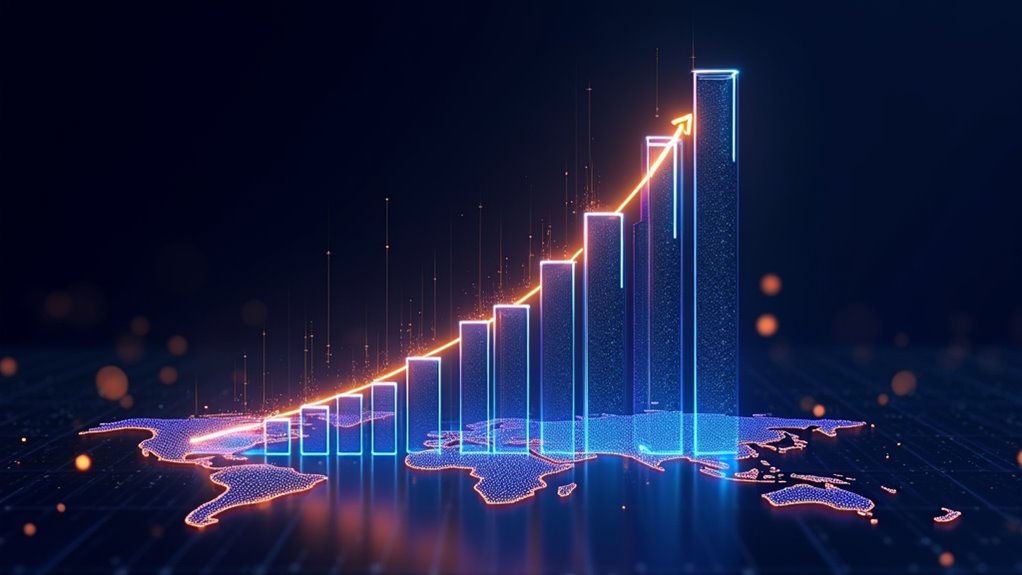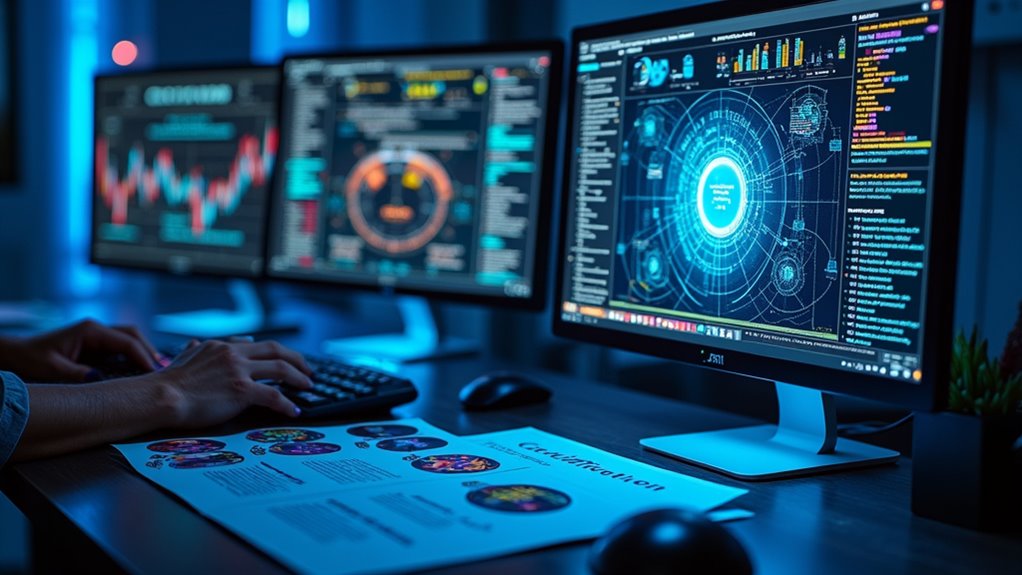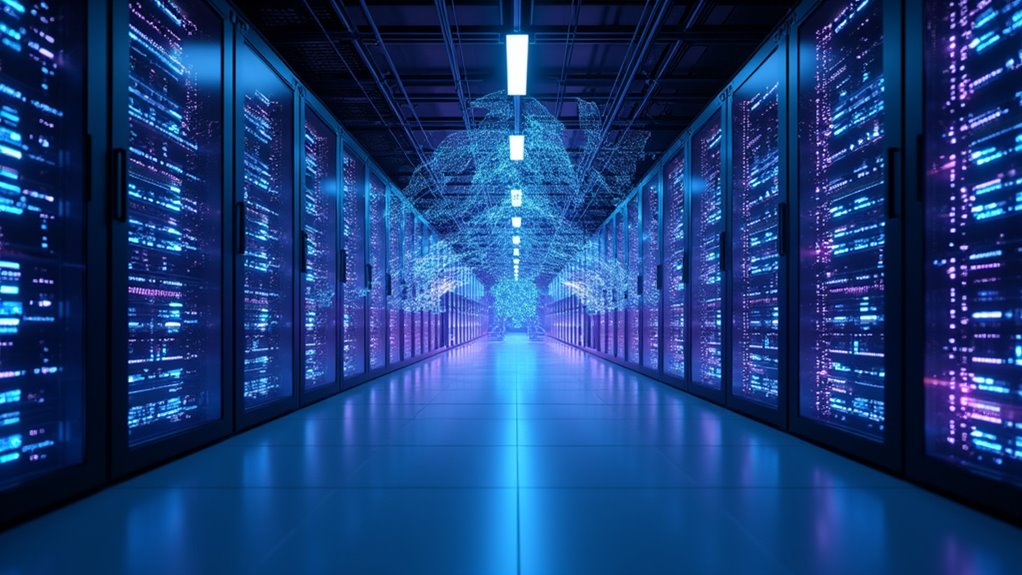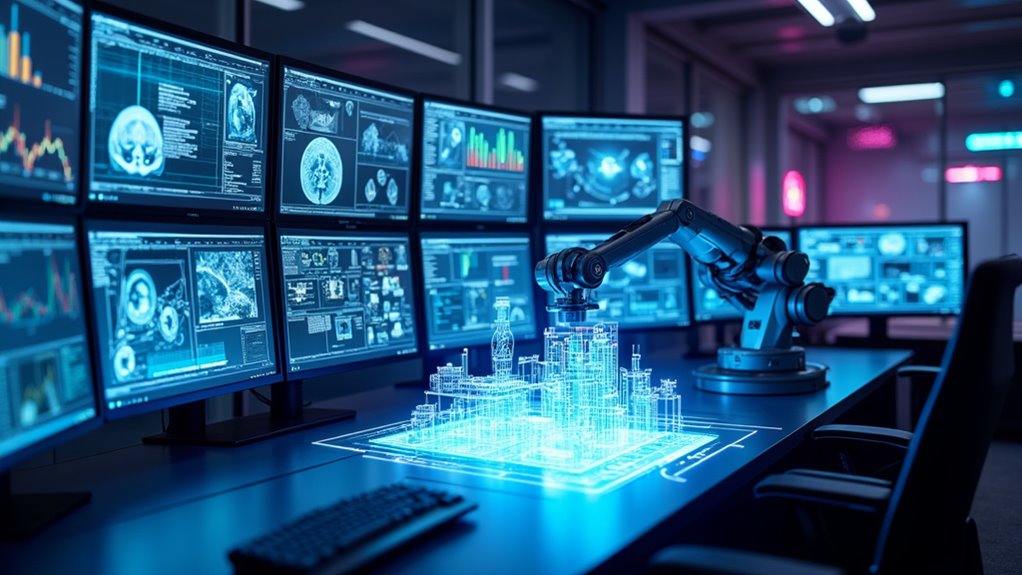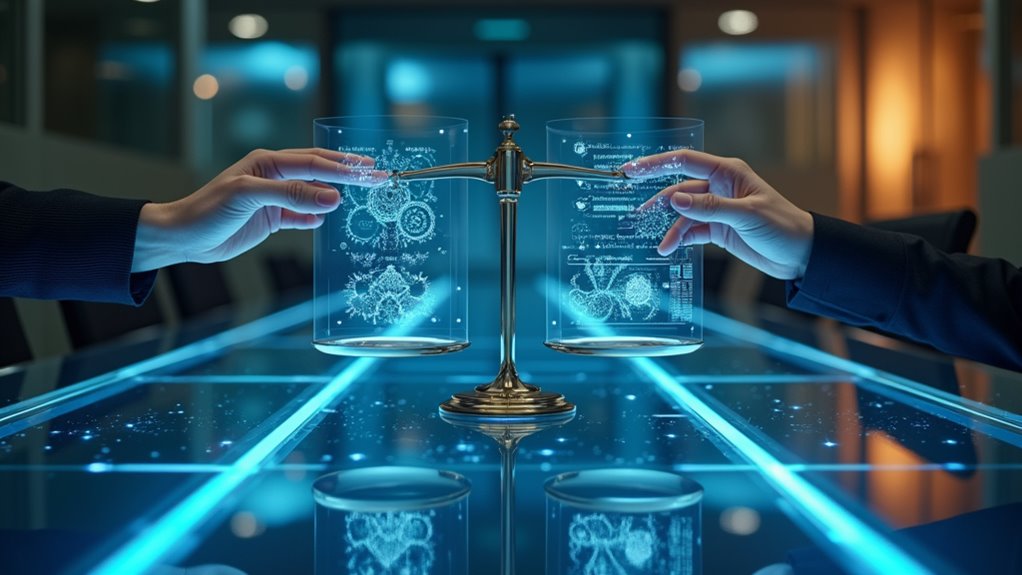AI processes data lightning-fast but lacks human creativity and emotional intelligence. Humans excel at one-shot learning and making value-based decisions, while AI needs massive datasets to recognize patterns. Think of it this way: AI follows recipes, humans invent cuisine. While machines outperform us in computational speed, they can’t understand experiences or generate truly original ideas. The future isn’t about competition but integration—combining AI’s processing power with human empathy and innovation opens doors neither could access alone.
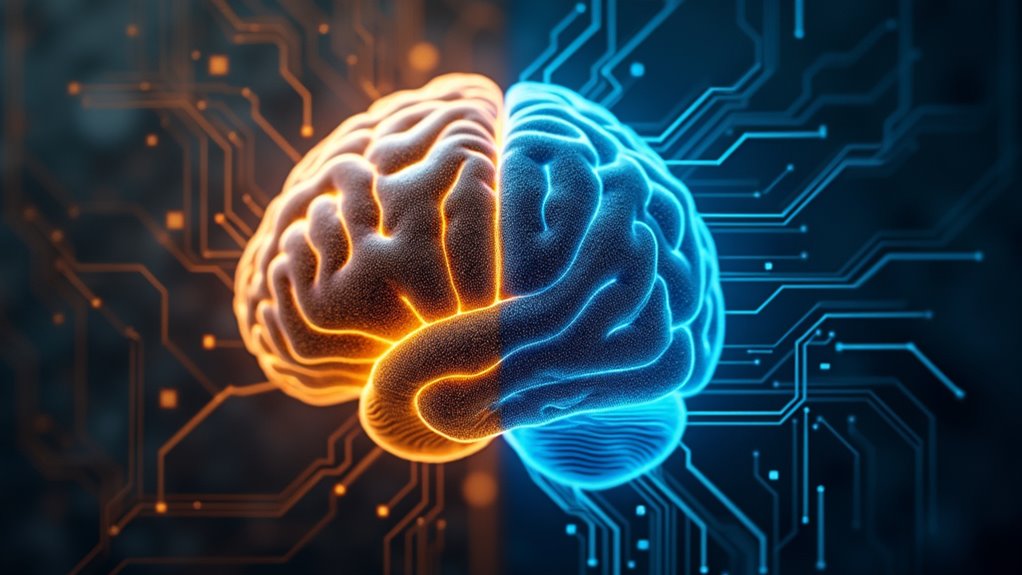
Why are we so fascinated by the comparison between artificial and human intelligence? Perhaps it’s because this comparison reveals what makes us uniquely human, while also showing how technology might transform our future. AI involves creating machines capable of tasks typically requiring human intelligence, a concept both exciting and unnerving as these systems rapidly evolve.
The fundamental difference lies in how learning happens. Humans develop cognitive abilities through experiences, observations, and education – often needing just one example to grasp a concept (that’s one-shot learning for you). AI, on the other hand, relies on machine learning algorithms that devour massive datasets like a hungry teenager at an all-you-can-eat buffet. This technological revolution has already demonstrated remarkable capabilities in data analysis across numerous industries, from healthcare to finance. Your brain intuitively understands abstract concepts while AI systems need explicit training. See the difference?
Creativity separates us further. Humans effortlessly generate novel ideas, art, and solutions by connecting seemingly unrelated concepts. AI can mimic creativity – yes, it might paint you a picture or write a poem – but it’s really just remixing patterns from existing works. It’s the difference between a chef creating a new dish versus following a recipe.
When making decisions, humans factor in emotions, personal values, and social context. AI processes information objectively, which sounds great until you need empathy. Your friend doesn’t want an algorithm calculating the best response when they’re crying about a breakup; they want understanding. Even the most advanced AI struggles with recognizing human emotions and social cues, while humans possess innate emotional intelligence that allows for meaningful connections.
AI crushes humans at data processing speed and efficiency. Need to analyze millions of medical records to find treatment patterns? AI finishes before your coffee gets cold. But put both in a room with a confused toddler, and only one can truly understand those tears and offer comfort. Current AI systems require constant updates to maintain their accuracy and relevance, unlike humans who adapt naturally to changing environments.
The future doesn’t pit AI against human intelligence but rather integrates them. The most powerful approach combines AI’s computational power with human emotional intelligence, creativity, and moral judgment. Together, they’ll tackle problems neither could solve alone.
Frequently Asked Questions
Can AI Develop Emotions Like Humans?
No, AI cannot develop genuine emotions like humans.
Current systems use emotional algorithms to recognize patterns in data, but they merely simulate emotions without experiencing them. Their empathy simulation is just sophisticated pattern matching—they don’t feel happiness, sadness, or love.
Unlike humans, AI lacks consciousness, biological components that generate feelings, and personal experiences that shape emotional growth.
AI can mimic emotional responses impressively, but it’s all computational, not felt.
Will AI Eventually Replace All Human Jobs?
No, AI won’t replace all human jobs, despite significant job automation trends.
While 800 million positions face potential displacement by 2030, certain human capabilities remain irreplaceable.
Creative fields, emotional intelligence work, and complex decision-making roles will persist in the future workforce.
Think about it—can AI truly replicate human intuition or empathy?
Jobs will transform rather than disappear completely, forcing workers to adapt.
The question isn’t if AI will take jobs, but which ones.
How Do Humans and AI Differ in Ethical Decision-Making?
Humans employ moral reasoning based on empathy, cultural values, and emotional intelligence—stuff AI simply can’t feel.
While humans navigate ethical gray areas intuitively, AI follows rigid decision frameworks programmed by humans (complete with their biases).
People understand nuance and can justify choices based on compassion or societal good. AI just crunches numbers.
Sure, algorithms make consistent decisions, but they lack the moral compass that makes us human.
The difference? Soul versus silicon.
Can AI Truly Understand Context in Communication?
AI struggles with contextual nuances in communication. While it can process language patterns, it often misses subtle cues that humans naturally grasp.
Language ambiguity remains a significant hurdle—sarcasm, cultural references, and emotional undertones frequently fly over AI’s digital head.
Sure, modern systems are improving, but they’re fundamentally pattern-matching machines without true understanding.
The gap between processing words and genuinely comprehending human communication contexts? It’s wider than most people realize.
What Cognitive Limitations Exist in AI Compared to Humans?
AI systems hit walls where humans break through barriers.
Despite excelling at pattern recognition, they lack genuine understanding of context and struggle with abstract problem solving. They can’t generalize knowledge to new situations like we can.
AI simply mimics creativity rather than generating truly novel ideas. They’re task-specific savants without human adaptability, operating within strict algorithmic boundaries.
Plus, they’re blind to ethical nuances that humans instinctively navigate.
Sorry, algorithms – humanity’s cognitive flexibility still reigns supreme.
